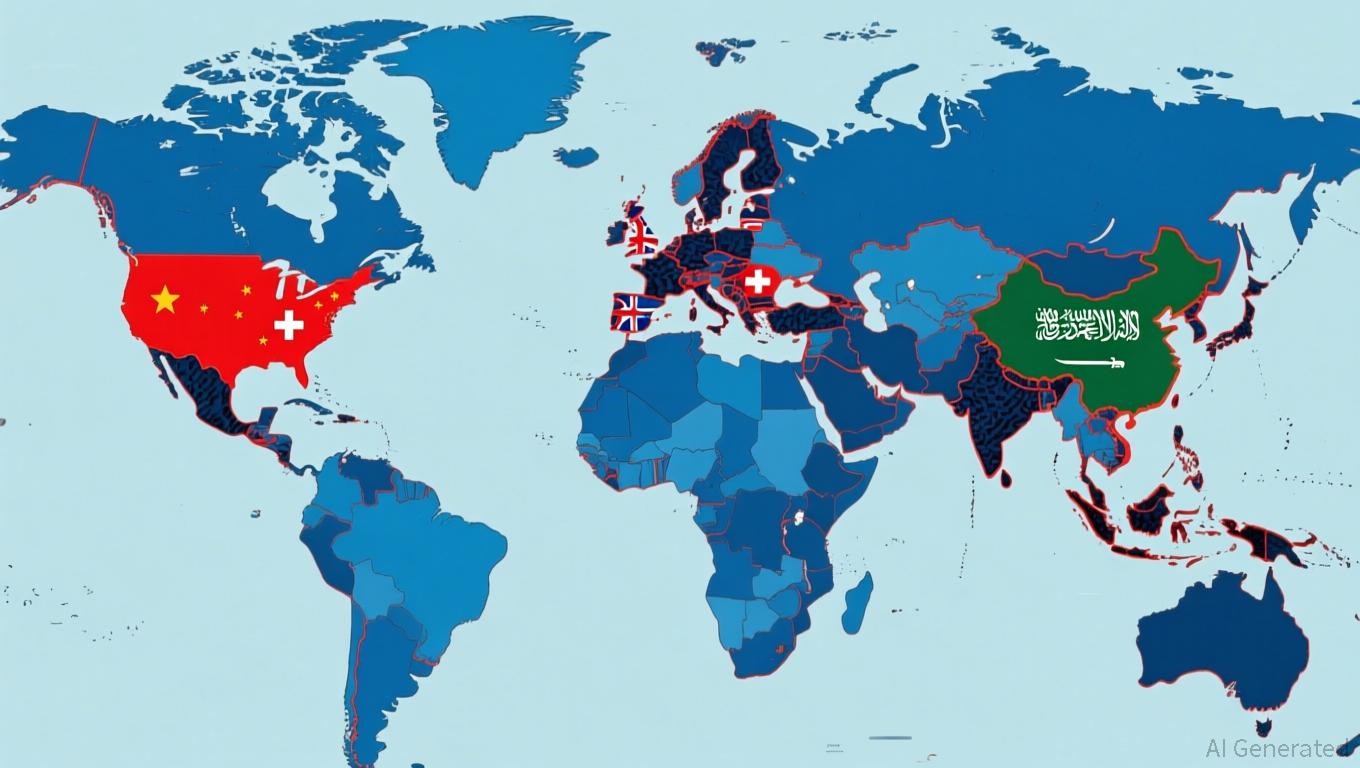Zcash (ZEC) Value Soars in Late 2025: Regulatory Transparency and Institutional Embrace Drive Growth in Privacy-Oriented Cryptocurrency
- Zcash (ZEC) surged 1,100% in November 2025 to $9.24B, driven by regulatory clarity, institutional adoption, and rising privacy demand amid CBDC concerns. - Grayscale's Zcash ETF filing and EU's 2027 privacy coin phaseout highlight regulatory duality, with optional transparency features attracting institutional investors. - Cypherpunk and Reliance Global's ZEC investments, plus $197M Grayscale holdings, signal privacy coins' shift from niche to mainstream financial assets. - Market dynamics show $2B daily
Zcash’s Remarkable Comeback in 2025
As the cryptocurrency sector rebounded in late 2025, Zcash (ZEC) emerged as a standout performer. Despite ongoing regulatory debates and economic uncertainty, Zcash soared by 1,100% in November, pushing its market value to $9.24 billion. This extraordinary growth is rooted not only in speculation but also in a blend of regulatory shifts, increased institutional participation, and a rising demand for privacy amid growing surveillance and central bank digital currency (CBDC) initiatives. Zcash’s journey provides a unique example of how privacy-oriented digital assets can adapt and even flourish in changing regulatory landscapes.
Regulatory Developments: Opportunity and Challenge
Zcash’s impressive gains in 2025 are closely tied to the evolving regulatory environment. Historically, privacy coins have faced resistance from lawmakers, but Zcash’s dual-transaction system—allowing both transparent and shielded transfers—has positioned it as a potential compromise between privacy and regulatory compliance. In the United States, Grayscale’s application for a spot Zcash ETF marks a significant milestone. This initiative, inspired by Grayscale’s earlier Bitcoin ETF, aims to legitimize Zcash for both institutional and individual investors by offering a regulated investment product. The ETF, which would trade in bundles of 10,000 ZEC on NYSE Arca, signals a growing willingness among traditional financial institutions to engage with privacy coins.
However, regulatory acceptance is far from uniform. The European Union’s 2024/1624 directive requires licensed exchanges to phase out privacy coins by 2027, creating a divided global market. Leading platforms such as Binance and Kraken have already limited ZEC trading in certain jurisdictions due to compliance concerns. In the U.S., legal actions against privacy-focused technologies, including the prosecution of Tornado Cash developers, have added further complexity. Nevertheless, Zcash’s ability to offer users a choice between shielded and transparent transactions may give it an edge over fully private coins like Monero (XMR), as noted by industry experts. This flexibility has attracted institutions seeking to innovate while remaining within regulatory boundaries.
Institutional Momentum: From the Margins to the Mainstream

Institutional engagement with Zcash has accelerated in 2025, fueled by strategic investments and the coin’s adaptable technology. Cypherpunk Technologies has acquired 1.43% of all ZEC, with intentions to expand its holdings to 5%. Reliance Global Group, a Nasdaq-listed fintech company, has converted its entire digital asset reserves to Zcash, citing its distinctive blend of privacy and regulatory compatibility. These moves reflect a broader acknowledgment of Zcash as both a safeguard against surveillance and a reliable store of value in the digital age.
Grayscale’s Zcash Trust, which manages $197 million in ZEC, further underscores this trend. By transitioning the trust into an ETF, Grayscale is paving the way for privacy-centric cryptocurrencies to enter mainstream investment portfolios. Additionally, cross-chain innovations—such as $15 million in trading volume for Solana-based zenZEC—demonstrate Zcash’s integration with scalable blockchain networks, enhancing its appeal for institutional use cases.
Market Forces: Privacy as a Valued Asset
The surge in Zcash’s price is supported by strong market fundamentals. Daily trading volumes have neared $2 billion, indicating robust liquidity and growing investor trust. The increasing prevalence of shielded transactions—now a major component of Zcash’s network activity—shows that privacy is not just a theoretical benefit but a feature actively sought by users. This trend is intensified by global apprehensions about CBDCs, which many see as instruments of government oversight. Zcash’s model of “selective transparency” resonates with those seeking greater financial independence, as highlighted by market analysts.
Nonetheless, the optimism surrounding Zcash is tempered by potential risks. The EU’s impending ban and ongoing U.S. regulatory actions could lead to liquidity challenges, especially if major exchanges remove ZEC from their platforms. Experts remain split: some view Zcash’s rally as speculative excess, while others interpret it as a lasting shift toward privacy-driven digital assets, according to recent market commentary.
Looking Forward: Navigating Innovation and Regulation
For Zcash to maintain its upward trajectory, it must carefully balance innovation with compliance. Its optional privacy features may help it gain regulatory approval, but the ecosystem’s reliance on shielded transactions could invite further scrutiny. The next few years will reveal whether Zcash can evolve technologically to meet new compliance demands without sacrificing its foundational commitment to privacy.
Investors interested in privacy coins should consider these factors thoughtfully. While Zcash’s growing institutional acceptance and regulatory initiatives point to broader adoption, the risks posed by shifting policies and potential liquidity issues remain significant. For those prioritizing stability and long-term potential over short-term gains, Zcash’s performance in 2025 highlights a key trend: privacy, once a niche concern, is now recognized as a strategic asset in a world increasingly defined by surveillance.
Disclaimer: The content of this article solely reflects the author's opinion and does not represent the platform in any capacity. This article is not intended to serve as a reference for making investment decisions.
You may also like
Switzerland Delays Crypto Information Exchange Pending International Coordination
- Switzerland delays crypto tax data sharing with foreign nations until 2027, citing unresolved CARF partner agreements. - The OECD's 2022 framework requires member states to exchange crypto account details, but 75 countries including the EU and UK face implementation challenges. - Transitional measures ease compliance burdens for Swiss crypto firms while awaiting finalized international data-sharing protocols. - Major economies like the U.S., China, and Saudi Arabia remain outside CARF due to non-complian

Bitcoin Updates: SGX Addresses Offshore Perp Shortfall as Bitcoin Decline Increases Demand for Hedging
- SGX launched Bitcoin and Ethereum perpetual futures, becoming a first-mover in regulated onshore crypto derivatives to meet institutional demand. - The $187B/year perp market, dominated by Asia, now gains a regulated alternative to offshore platforms with SGX's 22.5-hour trading window. - Perps enable hedging during Bitcoin's 2025 downturn, with SGX's margin-call system prioritizing investor protection over instant liquidations. - Regulatory caution limits access to accredited investors, aligning with gl

Bitcoin News Update: Institutional ETF Adjustments Challenge Key Bitcoin Support Thresholds
- Analysts warn Bitcoin faces 25% drop risk if key support levels fail amid shifting institutional ETF dynamics. - Texas's $5M IBIT purchase highlights growing government interest, but ETFs fall short of direct BTC ownership criteria. - Technical analysis shows Bitcoin trapped in a broadening wedge pattern, with breakdown below $80,000 risking $53k decline. - Institutional rebalancing sees $66M IBIT outflows vs. $171M FBTC inflows, signaling tactical ETF rotation over accumulation. - Abu Dhabi's $238M ETF

XRP News Today: IMF Cautions That Rapid Tokenized Markets Could Intensify Crashes in the Absence of Regulation
- IMF warned tokenized markets like XRP could worsen flash crashes without regulation, citing risks from decentralized systems lacking traditional safeguards. - Report acknowledged tokenization's potential to cut cross-border payment costs but highlighted volatility risks from rapid liquidity loss seen in crypto markets. - SEC's approval of crypto ETFs signals growing institutional acceptance, though regulators emphasize oversight frameworks to mitigate systemic risks. - IMF proposed a global digital marke
